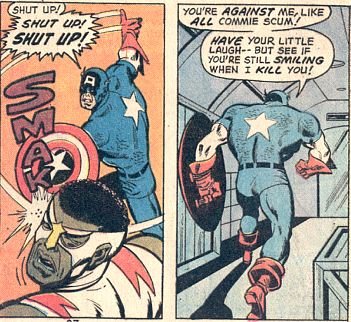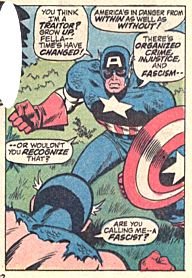The
Star-Spangled Anti-Communist:
Steve Englehart's Captain America
At first
glance Captain America seems to be an ideal comics character
to include in stories with a political viewpoint. After all,
a man who literally wraps himself in the stars and stripes
should have a lot of resonance as a symbol of America, its
swagger and symbols and sense of itself.
In actuality
most of the attempts to make him political have been either
dull, pointless or plain awful. The first storyline of the
current Captain America series is an example of a dull series
- it had nice art and the basic story, Cap going after terrorists,
was compelling, but it ended up being slow and dull.
Much worse
was Marvel's recent Truth: Red, White and Black mini-series.
The idea of exploring racism in the Marvel universe of the
1940s was potentially interesting, as was the main idea of
scientists beta-testing the super soldier formula on a group
of African-American soldiers. But the story was so ineptly
written by Robert Morales and so poorly realized that the
whole thing fell flat on its face. Of course, the comic's
quality wasn't helped by Kyle Baker's ugly and rushed art,
which seemed to be churned out merely to draw a paycheck instead
of to add an extra element to the story.
Still, Captain
America can be used well as part of a political storyline. It
just takes an extraordinarily skilled writer to pull it off.
Perhaps
the most interesting political takes on Captain America came
at a point when America's self-esteem was at its lowest ebb,
in the mid-'70s. When writer Steve Englehart assumed the reins
of the title in mid-1972, the United States was trapped in
a seemingly endless war in Vietnam that divided the American
people. On top of that, the '72 election was extraordinary
divisive and served to split the American populace further.
The '72 election also was the one in which Richard Nixon's
"plumbers" engaged in the Watergate break-in, resulting
in the worst American scandal of the post-World War II era.
In those
times, Captain America seemed more and more irrelevant. When
teenagers were burning their draft cards, when the movie Easy
Rider ironically nicknamed Peter Fonda's rebel motorcycle-riding
character Captain America, when the idea of pride in one's
country seemed like a quaintly dated idea, Captain America
felt like a relic of the World War II era, something to be
tossed aside next to Liberty Bonds and Rosie the Riveter.
Against
all odds, Englehart's run on Captain America was a
blockbuster.
Instead
of backing away from the politics of the title, Englehart
embraced them. Instead of having Cap be a living paragon of
American hegemony, Englehart depicted a man of his times,
full of questions about America's future, a man who saw it
as his patriotic duty to question his role in the deep splits
that defined America in the early '70s.
And he
was not just creatively successful, but also financially:
as Englehart relates in a 1980 interview in The Comic Times,
"The book had been at the bottom of the Marvel line and
in danger of cancellation until I took it over. It went to
the top of the line within six months and stayed there as
long as I had it. It immediately went back into the toilet
as soon as I left."
The first
story Englehart wrote for the series is one of his finest:
the Cap of the 1950s saga. Running from issues 153 to 156,
this story was created to answer a simple question: if Captain
America was frozen in ice at the end of World War II and unfrozen
in the 1960s, who was the Cap of the 1950s? Englehart answers
this question with great intelligence and insight, insight
not just into costumed characters but also into the changes
in American society between the 1950s and '70s. The Cap and
Bucky of the '50s were violent, racist anti-Communist crusaders
who saw the world as a simple struggle between good and evil.
That contrasted nicely with the '70s Captain America, who
then was teamed with the Falcon, a black character, and who
seemed to be struggling to find his place in a turbulent time
in America.
The perversity
of the '50s Cap and Bucky can be seen in this speech by the
'50s Cap in CA #155: "Oh, it was glorious! To
be a living legend - and fight the Red Skull - who turned
out to be a real Red who had stolen the name from the Nazi
villain! To battle the clutching hand of all Communism all
across he globe - in such other forms as the Russian killer
Elektro and the Chinese assassin, the Man With No Face. We
were the champions of democracy, the inspirations to millions
- Captain America and Bucky, the sentinels of liberty! But
somehow we seemed to outgrow the world. We began finding Reds
where others saw nothing, like in Harlem and Watts. In fact,
we found that most people who weren't pure-blooded Americans
were Commies!"
The '50s
Cap and Bucky were paranoid funhouse-mirror versions of Cap
and the Falcon. When the '70s Captain America confronts his
distorted '50s counterpart at the end of CA 156, Cap
realizes he's battling his doppelganger: "I've never
fought the evil side of my own nature. And that's what he
is, after all - a man who began with the same dreams I did
- and ended as an insane, bigoted superpatriot. He is what
he is because he admired me - wanted to copy me. In a very
real way, I'm responsible for all the evil he's done."
The '70s
Cap is finally able to defeat the '50s Cap, but the battle
shakes the '70s Cap down to his bones. He's confronting an
evil version of himself, but more than that, he's confronting
an evil version of the American dream that he stands for and
believes in. The modern Cap's defeat of his counterpart is
symbolic: not only is the '70s Cap ending an injustice, but
he's defeating an example of America's distorted past. He's
defeating a man who represents the myopic vision of anti-Communism,
proven wrong by the lessons of Vietnam.
This is
heady stuff for a comic from that era. Englehart would later
explore the Watergate scandal in a fictionalized form when
President Nixon is revealed to be the ringleader of an evil
organization called The Order. That sequence led to Cap removing
the costume and calling himself the Nomad for several months.
Ironically, the '50s Bucky would become the Nomad himself
in the 1980s and travel America in the costume that Cap once
wore.
Englehart's
run on Captain America, which ran from issue 153 through
186, is woefully under-represented in Marvel's reprints. It's
a shame, because they are some of the finest comics of the
1970s.
For
more articles by Jason Sacks, check out his
site.
|







